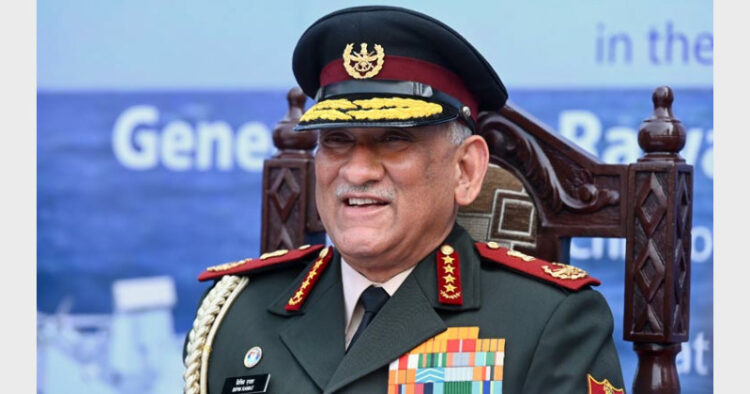While some quarters and government detractors tried to attack the Modi-led regime over the appointment of Bipin Rawat as the Army chief in 2016, the then Defence Minister Manohar Parrikar had defended the move. If seniority was the only criterion, then a computer could have selected a service chief, he had said.
New Delhi: I bow down in homage to one of the distinguished men in camouflage in recent years. But while doing so, I remember some of his widely publicized and scrutinized quotes. He was a "soldier's officer" to his force and men, to Prime Minister Narendra Modi-a strategic thinker, perhaps a little different from being 'a thinking strategist'.
In the words of Defence Minister Rajnath Singh, "As the first Chief of Defence Staff he had prepared plans for jointness of our Armed Forces."
He was part of the 'select few' planning team that ensured a historical success in the form of post-Uri Surgical Strike in September 2016 across LoC in Pakistan.
In 2015, in the northeast, he and his core team worked on finishing a highly successful 'response' to an ambush by NSCN-Khaplang militants beyond India's borders. He was the right man at the right time of history with the right job.
However, you often get into controversies in public life, especially in the Indian context, when showing your own country or forces in poor light is taken as a symbol of intellectual-liberalism (sic).
So, in 2016-17, the anti-Modi brigade kicked off controversies over the so-called 'supersession' of two other senior officers. But, the detractors of the Modi-led dispensation would do well to remember that superseding in army promotions had happened under the Congress regime, too.
Lt Gen S. K Sinha, who later became Governor of Assam and J&K, was superseded by Gen. A. K. Vaidya in the 1980s during the Indira Gandhi era. Sinha even took premature retirement. In December 2016, two senior officers Lt Gen Parveen Bakshi and Lt. Gen P. M Hariz were superseded. Both were commissioned in December 1977 and June 1978.
Rawat had joined the forces only in December 1978. Sources later said Rawat's experience in Kashmir and the North East as a Corps Commander at Rangapahar/Dimapur in Nagaland perhaps 'overshadowed' the claims of the two senior officers.
Of course, after taking over as the army chief, Gen Rawat said he had worked with both the officers and expected cooperation. He got good wishes from both too.
Soft-spoken but always assertive, the then Defence Minister Manohar Parrikar had defended the government decision. He had said – if seniority was the only criterion, then a computer could have selected a service chief.
"There would be no requirement of any Raksha Mantri, there would be no requirement of Cabinet Committee on appointment because then it is a computer job. Date of birth decides who becomes General," said Parrikar, now deceased and known for his Marathi-Goan mixed variety of humour.
If asked about that veiled-attack prone wordings – Late Parrikar would smilingly say – "Well, Goan fish gives me those". Parrikar, too, had a high opinion about Gen Rawat.
Another former Defence Minister, Arun Jaitley, a man gifted with oratory and excellent writing skills, once told Gen Rawat- "Don't worry…. When you run out of funds, call me."
Of course, Jaitley was Finance Minister and held the Defence portfolio twice. Gen Rawat's reform strategy for the Indian army and two other forces was path-breaking and very candid regarding financial management for defence preparedness and soldiers' welfare.
Those who track the country's defence and security apparatus closely say, as the Army chief and later as the first CDS, Rawat was a 'perfect team man' in the Team Modi alongside the likes of Parrikar, Jaitley, Nirmala Sitharaman and of course Ajit Doval and from time to time Rajnath Singh and Amit Shah as the 'need' required.
Gen Rawat played a crucial role in February 2019 after the Pulwama terror attack. The Indian army reciprocated the September 2016, Pakistan's Uri misadventure during the tenure of Rawat's predecessor Gen Dalbir Singh Suhag. But he was involved in the planning.
The top military brass and a highly decorated officer had defended Maj. Leetul Gogoi over the 'human shield' episode during a high-risk stone-pelting hit operation in Kashmir.
"It (human shield) is not a general norm. As a practice it is not supported. But situations would dictate. Under the circumstances, he (Major Gogoi) took a decision independently. He can't look back at that stage and wait for orders," General Rawat had said.
"If somebody has any other ideas as to how to tackle such a situation, then he can pass it on to us. We will take a look at it," he had said tongue-in-cheek.
Long live, General.














Comments